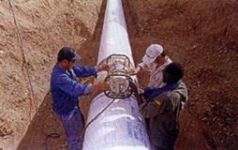Sudan opens oil pipeline able to pump 500,000 bpd
April 10, 2006 (FALLOUJ) — Sudan’s oil minister on Monday inaugurated its newest pipeline, which will raise oil production to 500,000 barrels per day (bpd) and provide a structure to potentially double output in the coming year.
 Mohamed Salih Osman, the project manager, said that initially 88 oil wells would provide between 160,000 – 180,000 bpd in the 1,400 km (870 mile) pipeline from Upper Nile in Sudan’s south east to the eastern Port Sudan.
Mohamed Salih Osman, the project manager, said that initially 88 oil wells would provide between 160,000 – 180,000 bpd in the 1,400 km (870 mile) pipeline from Upper Nile in Sudan’s south east to the eastern Port Sudan.
The 32-inch pipeline would take 45 days to fill and could carry up to 750,000 bpd eventually, but is currently able to pump 500,000 bpd.
The oil fields, called Block 3 and 7, are operated by Petrodar, a consortium made up mostly of state-owned China National Petroleum Corp., Malaysia’s Petronas [PETR.UL], with smaller shares for Sudan’s Sudapet, China’s Sinopec and al-Thani of the United Arab Emirates.
Petrodar Vice President Khidder Eissawi told Reuters another oil field had been discovered in the area, which looked to contain as much oil as the existing fields. Blocks 3 and 7 are in the south eastern Melut Basin region.
“There is a lot of oil in this area,” he said. He added the pipeline could also eventually pump crude from nearby Block B, where French giant Total SA is to operate.
Shortly after Africa’s longest civil war in Sudan’s south was ended by a January 2005 peace deal, the former southern rebel Sudan People’s Liberation Movement (SPLM) awarded a new British firm, White Nile , exploration rights in part of Block B.
This contradicted Total’s claim signed with the northern government in 1980 — before the war — and renewed last year.
Under the peace deal a National Petroleum Commission has been formed to decide new contracts and address such disagreements.
But the southerners, scattered after more than two decades of civil war which claimed 2 million lives, are facing problems in finding people with the oil expertise to fill their posts.
There is also dispute between the two sides over how much current oil production there is.
Western companies have mostly withdrawn from Sudan over alleged abuses of the local population’s rights, leaving the region dominated by mainly state-owned Chinese, Malaysian and Indian entities.
(Reuters)
